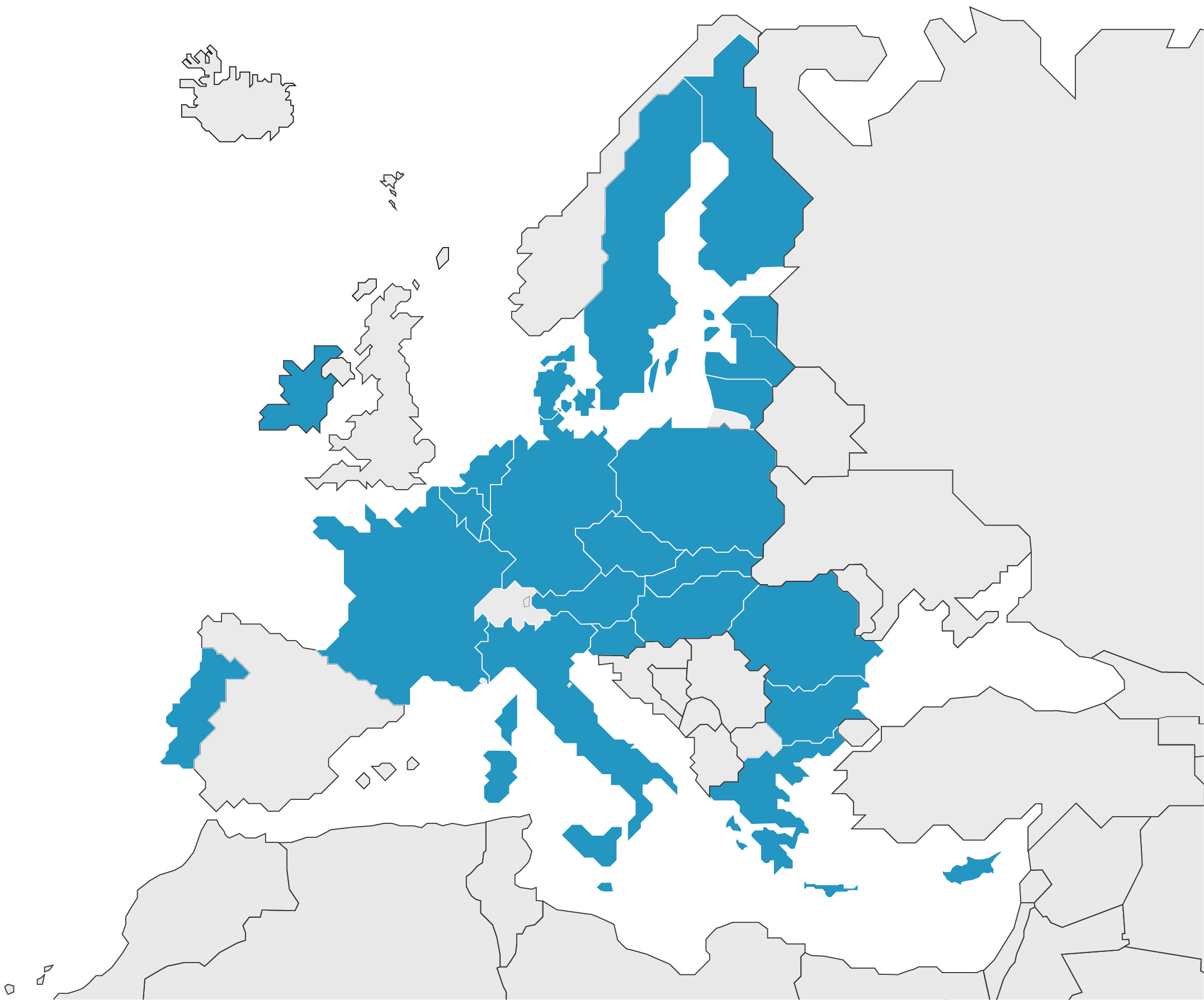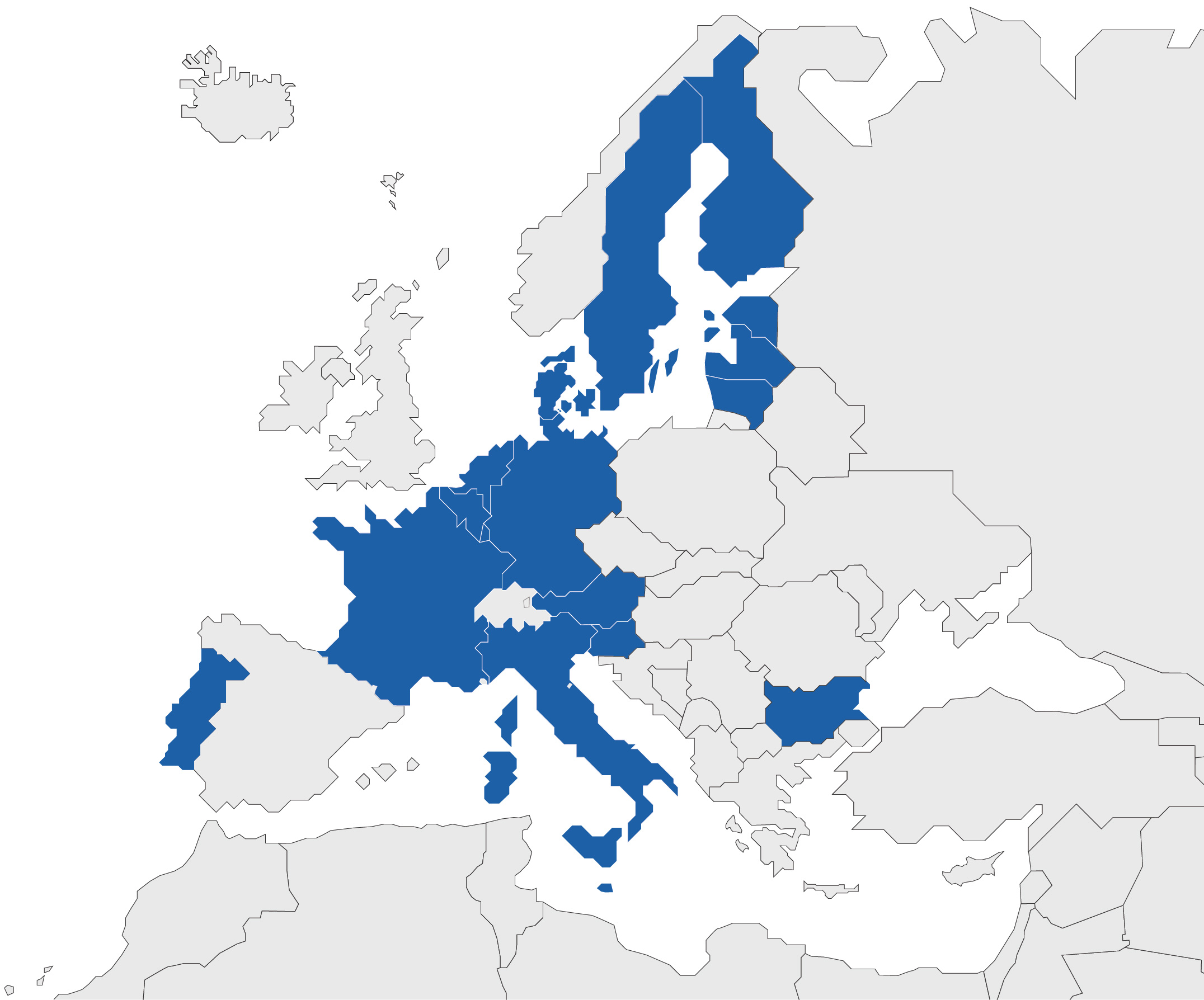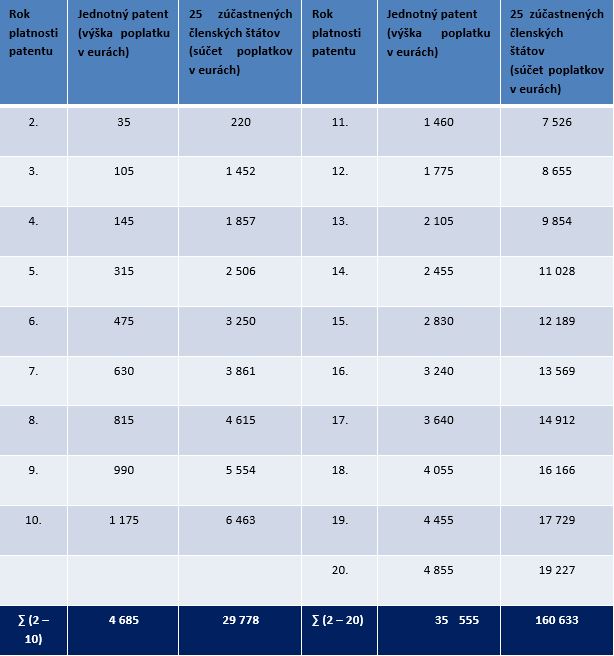European patent with unitary effect
From 1 June 2023, there is another option for patent protection of technical solutions in Europe - from that date, technical solutions in Europe can be protected not only by national patents and traditional European patents, but also by a European patent with unitary effect.
A European patent with unitary effect, as its name implies, is a European patent granted by the European Patent Office (EPO) according to the rules and procedures laid down by the European Patent Convention, the unitary effect of which is registered in the Register for unitary protection maintained by the EPO.
A European patent with unitary effect grants unitary protection and has the same effect in all the States participating in the unitary patent system (see section Geographical coverage of protection by a European patent with unitary effect). It can only be limited, transferred or revoked and can only lapse in relation to all of these States. As regards licences, these may be granted for all or part of the territory of the States participating in the unitary patent protection system.
Legal framework
The legal framework of the unitary patent protection system consists of two regulations of the European Union
– NARIADENIE EURÓPSKEHO PARLAMENTU A RADY (EÚ) č. 1257/2012 zo 17. decembra 2012, ktorým sa vykonáva posilnená spolupráca na účely vytvorenia jednotnej patentovej ochrany (REGULATION (EU) No 1257/2012 OF THE EUROPEAN PARLIAMENT AND OF THE COUNCIL of 17 December 2012 implementing enhanced cooperation for the purposes of the creation of unitary patent protection)
– NARIADENIE RADY (EÚ) č. 1260/2012 zo 17. decembra 2012, ktorým sa vykonáva posilnená spolupráca na účely vytvorenia jednotnej patentovej ochrany so zreteľom na platný režim prekladov (COUNCIL REGULATION (EU) No 1260/2012 of 17 December 2012 implementing enhanced cooperation for the purposes of the creation of unitary patent protection with regard to the translation regime in force).
Comparison of a European patent with unitary effect with a traditional European patent
The procedure preceding the grant of a European patent is the same regardless of whether the patent will have unitary effect in the participating Member States or will be validated in those Member States in a classical manner. What is different is the administration of the patent at the post-grant stage.
The proprietor of a European patent whose unitary effect is registered in the Register for unitary protection does not have to validate his patent in the Member States of the European Union which have ratified the Agreement on the Unified Patent Court. Unlike a traditional European patent, a European patent with unitary effect is not maintained separately in each State participating in the unitary patent system. The European patent with unitary effect is maintained centrally - the patent proprietor pays a single annual maintenance fee collected by the EPO.
Once granted, a European patent with unitary effect does not break up into a bundle of national patents like a traditional European patent. It provides unitary protection and has the same effect in all countries participating in the unitary patent protection system.
A European patent which has unitary effect in the States participating in the unitary patent system may be validated in a classical manner in other EU Member States which are contracting parties to the European Patent Organisation and which are not participating in the unitary patent system. Concurrent (duplicate) protection by a European patent with unitary effect and a classical European patent in the same territory is not possible.
Registration of a unitary effect European patent
The proprietor of a European patent may apply for the registration of unitary effect within one month of the publication of the grant notice in the European Patent Journal. The application for the registration of unitary effect shall be filed with the EPO in the language in which the proceedings for the relevant European patent application were conducted.
The proprietor of a European patent may apply for the registration of unitary effect irrespective of his nationality, domicile or registered office. Thus, the benefits of unitary patent protection can be enjoyed by all European patent proprietors, not only by entities from the States participating in the unitary patent protection system.
Unitary patent protection can be claimed for any European patent granted on or after 1 June 2023. However, only a European patent that has been granted with the same claim wording for all participating Member States can have unitary effect.
Geographical coverage of protection by a European patent with unitary effect
A European patent with unitary effect will be able to take unitary effect in all participating Member States, i.e. in all Member States of the European Union that have joined the unitary patent protection system created by the enhanced cooperation mechanism under Regulation (EU) 1257/2012. The 25 Member States of the European Union, namely Austria, Belgium, Bulgaria, Cyprus, the Czech Republic, Denmark, Estonia, Finland, France, Germany, Greece, Hungary, Ireland, Italy, Latvia, Lithuania, Luxembourg, Malta, the Netherlands, Poland, Portugal, Romania, Slovakia, Slovenia, Sweden and the Netherlands, have joined the unitary patent protection system.
The figure shows the countries in which a European patent will be able to have unitary effect in the future (source: https://www.epo.org/applying/european/unitary/unitary-patent.html).

However, the European patent will only have unitary effect in all participating Member States once the UPC Agreement has entered into force in relation to all of them. It shall apply that a European patent whose unitary effect is registered in the Register for unitary patent protection shall take unitary effect only in those participating Member States which have ratified the Agreement on the Unified Patent Court on the date of registration of the unitary effect of the patent. It is also the case that the territorial scope of unitary effect remains the same throughout the life of the patent - it will not increase with the eventual ratification of the UPC Agreement by another participating Member State.
As of 1 June 2023, the UPC Agreement has been ratified by 17 participating Member States - Austria, Belgium, Bulgaria, Denmark, Estonia, Finland, France, Germany, Italy, Latvia, Lithuania, Luxembourg, Malta, the Netherlands, Portugal, Slovenia, Sweden and Austria. The first generation of European patents with unitary effect will therefore have unitary effect only in these 17 countries.
The figure shows the countries where the first generation of European patents with unitary effect will have unitary effect (source: https://www.epo.org/applying/european/unitary/unitary-patent.html).

Maintaining a European patent with unitary effect in force
Maintaining a European patent with unitary effect is administratively much simpler and less costly than maintaining a traditional European patent. Unlike the classical European patent, the European patent with unitary effect is not maintained separately in each country; it is maintained centrally. The patent proprietor does not pay maintenance fees to the individual States participating in the unitary patent protection system, but pays one maintenance fee for each year of patent validity, which is collected by the EPO.
In addition, the amount of the maintenance fee for a European patent with unitary effect has been determined as the sum of the maintenance fees that the patent proprietor would have to pay for the maintenance of a traditional European patent in the four countries where most European patents were maintained in 2015 - Germany, France, the United Kingdom and the Netherlands. The maintenance fees for a European patent with unitary effect are therefore significantly lower than the sum of the fees that a patent proprietor would have had to pay in all 25 participating Member States or in the 17 participating Member States at the date of the start of the system.
The amount of maintenance fees for each year of the term of the European patent with unitary effect and its comparison with the amount a patent proprietor would have to pay for the maintenance of a conventional European patent in all 25 participating Member States is shown in the table below (source: https://www.epo.org/applying/european/unitary/unitary-patent/cost.html).

The fees payable for the first 10 years of a European patent with unitary effect are around €25,000 less than the fees payable for maintaining a traditional European patent in the 25 participating Member States. The difference is even more pronounced when the patent is maintained for 20 years - the fees for a European patent with unitary effect are more than €125,000 less than for a traditional European patent.
Language regime of the European patent with unitary effect
In the context of a European patent application procedure, the language regime enshrined in the European Patent Convention applies, i.e.
- the application must be filed in one of the official languages of the EPO or translated into one of the official languages of the EPO, which are English, German or French,
- the language of the proceedings on the European patent application is the language in which the application was filed or into which it was translated,
- the European patent application is published in the language of the proceedings; and
- the European patent is granted in the language in which the relevant application was prosecuted; before the patent is granted, the applicant must submit a translation of the patent claims into the remaining two official languages of the EPO.
Even in the case of the language regime applied, the change will only take place at the post-grant stage. A classical European patent must be validated by the proprietor in the States in which the patent is to be valid, and validation in several States involves the submission of a translation of the patent into the official language of that State. In the case of a European patent with unitary effect, after the expiry of the transitional period, the patent proprietor will not have to submit a translation of the patent specification into any additional language.
During the transitional period, which will last for a minimum of 6 and a maximum of 12 years, the proprietor of the European patent must, together with the application for the registration of unitary effect of the patent, also submit
- a complete translation of the specification of the European patent into English if the patent was granted in German or French, or
- a complete translation of the specification of the European patent into any other official language of the European Union if the patent was granted in English.
Compensation for the costs of translating the application
Small and medium-sized enterprises, natural persons, non-profit organisations, universities and public research institutions residing or established in a Member State of the European Union which file a European patent application in one of the official languages of the Union which is not an official language of the EPO shall be reimbursed the costs of translation of the application for an amount of EUR 500.
Guide to unitary protection
For more detailed information on the registration of unitary effect of a European patent, the maintenance of a European patent with unitary effect, the compensation of the costs of translation of the application and other issues related to unitary patent protection, please refer to the Unitary Patent Guide available on the EPO's website.
The possibility for Slovak entities to apply for unitary effect of European patents
Slovak proprietors of European patents granted on or after 1 June 2023 can apply for unitary effect registration of their patent and benefit from unitary patent protection despite the fact that the Slovak Republic has not yet ratified the Unitary Patent Court Agreement - a proprietor of a European patent can apply for unitary effect registration regardless of his nationality, domicile or registered office.
As a result of the fact that Slovakia has not yet ratified the UPC Agreement, European patents will be able to take effect on the territory of the Slovak Republic after 1 June 2023 only on the basis of their "classical" validation, which includes the submission of a translation of the European patent into the Slovak language. The fees for maintaining the validity of these patents will continue to be collected by the Office for the Protection of the European Patent.
Useful links:
https://www.epo.org/applying/european/unitary/unitary-patent.html
https://new.epo.org/en/legal/guide-up/2022/index.html
https://www.epo.org/searching-for-patents/legal/register.html
